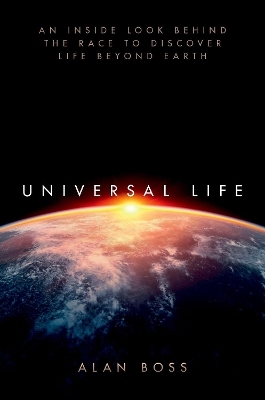
Universal Life
Oxford University Press Inc (Verlag)
978-0-19-086405-7 (ISBN)
After decades of painstaking planning, NASA's first dedicated exoplanet detection mission, the Kepler space telescope, was launched in 2009 from Cape Canaveral. Kepler began a years-long mission of looking for Earth-like planets amongst the millions of stars in the northern constellations of Lyra and Cygnus. Kepler's successful launch meant that it was only a matter of time before we would know just how many Earth-like planets exist in our galaxy. A revolution in thinking about our place in the universe was about to occur, depending on what Kepler found. Are Earths commonplace or rare? Are we likely to be alone in the universe? Only Kepler could start to answer these vexing questions.
Universal Life provides a unique viewpoint on the epochal events of the last two decades and the excitement of what will transpire in the coming decades. Author Alan Boss's perspective on this story is unmatched. Boss is the Chair of NASA's Exoplanet Exploration Program Analysis Group, and was also on the Kepler Mission science team. Kepler proved that essentially every star in the night sky has a planetary system, and that most of these systems contain a habitable world, potentially capable of evolving and supporting life. Universal Life summarizes the current state of exoEarth knowledge, and also reveals what will happen next in the post-Kepler world, namely the narrowing of the search for habitable worlds to the stars that are the closest to Earth, those that offer the best chances for future ground- and space-based telescopes to search for, and detect, possible signs of life in their atmospheres. We have come far in the search for life beyond the Earth, but the most exciting phase is about to begin: we may soon be able to prove that we are not alone in the universe.
Alan Boss is an astrophysicist and and has been helping NASA plan its search for exoplanets since 1988. For the past thirty-five years, Boss has been on staff at the Carnegie Institution for Science in the Department of Terrestrial Magnetism. He leads a ground-based astrometric planet search effort at the Las Campanas Observatory in Chile. He currently chairs NASA's Exoplanet Exploration Program(ExEP) Analysis Group and the ExEP Technology Assessment Committee. Boss is a member of the NASA Astrophysics Advisory Committee and the National Academy of Sciences Committee on the Astrobiology Science Strategy for the Search for Life in the Universe.
AcknowledgmentsPrologueChapter 1: Don't Take No for an AnswerChapter 2: Waiting for Kepler to Deliver the GoodsChapter 3: Astro 2010 Comes to BatChapter 4: Barcelona is in Catalonia, Not in SpainChapter 5: Witness Protection ProgramChapter 6: The President Proposes, Congress DisposesChapter 7: Open for Business, Under New ManagementChapter 8: Bring Out Your DeadChapter 9: Ominous Signs from MarylandChapter 10: Ground-based Telescopes Score a Hat TrickChapter 11: And That's Not AllChapter 12: Proxima Centauri b Arrives on StageChapter 13: Speaking of the Decadal SurveyChapter 14: November 9, 2016, A Day That ShallChapter 15: And the Winners AreChapter 16: Say, Could You Help Me OutChapter 17: The Pre-Decadal-Survey Decadal SurveyFinaleList of Acronyms and AbbreviationsIndex
| Erscheinungsdatum | 09.01.2019 |
|---|---|
| Zusatzinfo | 17 color halftones, 7 b/w halftones, and 6 line art |
| Verlagsort | New York |
| Sprache | englisch |
| Maße | 241 x 163 mm |
| Gewicht | 454 g |
| Themenwelt | Sachbuch/Ratgeber ► Natur / Technik ► Weltraum / Astronomie |
| Naturwissenschaften ► Physik / Astronomie ► Astronomie / Astrophysik | |
| ISBN-10 | 0-19-086405-2 / 0190864052 |
| ISBN-13 | 978-0-19-086405-7 / 9780190864057 |
| Zustand | Neuware |
| Informationen gemäß Produktsicherheitsverordnung (GPSR) | |
| Haben Sie eine Frage zum Produkt? |
aus dem Bereich


